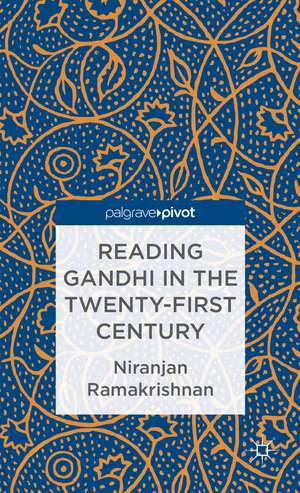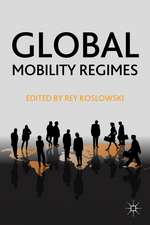Reading Gandhi in the Twenty-First Century
Autor Niranjan Ramakrishnanen Limba Engleză Hardback – 31 ian 2013
Preț: 364.08 lei
Nou
Puncte Express: 546
Preț estimativ în valută:
69.66€ • 72.93$ • 57.64£
69.66€ • 72.93$ • 57.64£
Carte tipărită la comandă
Livrare economică 05-19 aprilie
Preluare comenzi: 021 569.72.76
Specificații
ISBN-13: 9781137325143
ISBN-10: 1137325143
Pagini: 142
Ilustrații: X, 138 p.
Dimensiuni: 140 x 216 x 15 mm
Greutate: 0.32 kg
Ediția:2013
Editura: Palgrave Macmillan US
Colecția Palgrave Pivot
Locul publicării:New York, United States
ISBN-10: 1137325143
Pagini: 142
Ilustrații: X, 138 p.
Dimensiuni: 140 x 216 x 15 mm
Greutate: 0.32 kg
Ediția:2013
Editura: Palgrave Macmillan US
Colecția Palgrave Pivot
Locul publicării:New York, United States
Cuprins
1. Prologue: A World at Sea 2. What's so Great about Gandhi, Anyway? 3. Gandhi in the Time of Terrorism 4. Privatization…Privation…Privacy 5. Globalization…of What? 6. A Fundamental(ist) Irony 7. Environmentalism 8. The C(l)ash of Civilizations 9. East Vs. West: Win, Lose or Draw? 10. Media Matters, Citizen Mutters 11. Technological Titans, Moral Midgets 12. Corruption and its Discontents 13. Of Suicides and Stock Markets 14. Unbroken Connectivity, Broken Lives: Industrialism and its Consequences 15. W(h)ither the State? 16. Epilogue: Where do we go from here?
Recenzii
"Niranjan Ramakrishnan's Reading Gandhi in the Twenty-First Century is a discovery of the Mahatma, whom we have made synonymous with a timid view of non-violence and discarded his thoughts as outdated. 'Gandhi's tragedy is that he is unsung, even unknown for his greatest contribution, even in the land of his birth,' rues Ramakrishnan. Very true. How many of us know his views on environment, demand-led economy, swaraj from state control and globalization?" - The Financial Express
"Scholarship on Gandhi often verges on the hagiographic, which makes it difficult to relate his thoughts to the modern generation with its irreverent attitude . . . Gandhi has more practical achievements, social and political, to his credit than almost any other thinker. Reading Gandhi in the Twenty-First Century . . . provokes and prods the reader with its broad canvas, incisive comments and relevance." - Tribune India
"A man of rare personal courage, Niranjan Ramakrishnan offers witty, quotable sentences and an illuminated understanding of Gandhi's mind." - Rajmohan Gandhi, former University of Illinois professor and author of an award-winning biography of his grandfather, Mahatma Gandhi
"There is no doubt that modern "civilization" has lost its bearings or - in my opinion - that Mahatma Gandhi saw this and applied his whole life to helping us correct course. But that is not widely understood or appreciated, and therefore Dr. R.'s volume, which brings up our many difficulties, not without bitterness but always with insight, and the acuity with which Gandhi addressed them, can be a very useful contribution. The more people read and take to heart his point the more we may be in a position to revivify Gandhi's legacy." - Michael Nagler, President, Metta Center for Nonviolence, USA
"We think of Gandhi's work, generally, in the context of nonviolence, which he helped prove is one of the greatest forces mankind can use for political and social change. But there is so much more to him and his teachings. This wide-arc view of his life and teachings in the context of modern-day events is brilliant, readable, and should be taught to every student in the world. Gandhi truly was a prophet, not just for his time but for ours as well." - Thom Hartmann, host of The Thom Hartmann Program, political commentator, and contributor to Air America: The Playbook
"The problems with which M.K. Gandhi struggled during his lifetime are extremely relevant to us in the 21st Century, when both nuclear and ecological catastrophes threaten human civilization. Whoever doubts this should study Dr. Niranjan Ramakrishnan's excellent book, 'Reading Gandhi in the 21st Century'. The serious problems that face us today are all there threats to the environment, growing population, vanishing resources, the predicted global food crisis, intolerable economic inequality, the threat of nuclear war, the military industrial complex, and limits to economic growth. But Gandhi's wise and timeless solutions are there too. Read it by all means!" - John Scales Avery, Lektor Emeritus and Associate Professor, University of Copenhagen, and winner as part of the Pugwash Conferences on Science and World Affairs of the 1995 Nobel Peace Prize
"In this elegant little book, Niranjan Ramakrishnan shows how Gandhi's ideas speak directly to the problems that beset India and the world today. Gandhi's message, which combines courage with compassion, is here conveyed with charm and civility. As Ramakrishnan demonstrates, whether it be promoting non-violent resistance to unjust authority, or the compassionate exercise of state power, or designing technologies on a human scale and for a human purpose, or cultivating an ethic of environmental responsibility - in these (and other) respects we all have much to learn from Gandhi." - Ramachandra Guha, author of India after Gandhi
"People think of Gandhi as the leader who taught the people of India to resist British imperialism with nonviolence.
In this thoughtful and easy to read book, Niranjan Ramakrishnan shows that Gandhi was also a futurist whose thoughts are relevant to the problems that Western civilization faces in the 21st century." - Paul Craig Roberts, Assistant Secretary of the Treasury under Ronald Reagan and former associate editor of The Wall Street Journal
"Scholarship on Gandhi often verges on the hagiographic, which makes it difficult to relate his thoughts to the modern generation with its irreverent attitude . . . Gandhi has more practical achievements, social and political, to his credit than almost any other thinker. Reading Gandhi in the Twenty-First Century . . . provokes and prods the reader with its broad canvas, incisive comments and relevance." - Tribune India
"A man of rare personal courage, Niranjan Ramakrishnan offers witty, quotable sentences and an illuminated understanding of Gandhi's mind." - Rajmohan Gandhi, former University of Illinois professor and author of an award-winning biography of his grandfather, Mahatma Gandhi
"There is no doubt that modern "civilization" has lost its bearings or - in my opinion - that Mahatma Gandhi saw this and applied his whole life to helping us correct course. But that is not widely understood or appreciated, and therefore Dr. R.'s volume, which brings up our many difficulties, not without bitterness but always with insight, and the acuity with which Gandhi addressed them, can be a very useful contribution. The more people read and take to heart his point the more we may be in a position to revivify Gandhi's legacy." - Michael Nagler, President, Metta Center for Nonviolence, USA
"We think of Gandhi's work, generally, in the context of nonviolence, which he helped prove is one of the greatest forces mankind can use for political and social change. But there is so much more to him and his teachings. This wide-arc view of his life and teachings in the context of modern-day events is brilliant, readable, and should be taught to every student in the world. Gandhi truly was a prophet, not just for his time but for ours as well." - Thom Hartmann, host of The Thom Hartmann Program, political commentator, and contributor to Air America: The Playbook
"The problems with which M.K. Gandhi struggled during his lifetime are extremely relevant to us in the 21st Century, when both nuclear and ecological catastrophes threaten human civilization. Whoever doubts this should study Dr. Niranjan Ramakrishnan's excellent book, 'Reading Gandhi in the 21st Century'. The serious problems that face us today are all there threats to the environment, growing population, vanishing resources, the predicted global food crisis, intolerable economic inequality, the threat of nuclear war, the military industrial complex, and limits to economic growth. But Gandhi's wise and timeless solutions are there too. Read it by all means!" - John Scales Avery, Lektor Emeritus and Associate Professor, University of Copenhagen, and winner as part of the Pugwash Conferences on Science and World Affairs of the 1995 Nobel Peace Prize
"In this elegant little book, Niranjan Ramakrishnan shows how Gandhi's ideas speak directly to the problems that beset India and the world today. Gandhi's message, which combines courage with compassion, is here conveyed with charm and civility. As Ramakrishnan demonstrates, whether it be promoting non-violent resistance to unjust authority, or the compassionate exercise of state power, or designing technologies on a human scale and for a human purpose, or cultivating an ethic of environmental responsibility - in these (and other) respects we all have much to learn from Gandhi." - Ramachandra Guha, author of India after Gandhi
"People think of Gandhi as the leader who taught the people of India to resist British imperialism with nonviolence.
In this thoughtful and easy to read book, Niranjan Ramakrishnan shows that Gandhi was also a futurist whose thoughts are relevant to the problems that Western civilization faces in the 21st century." - Paul Craig Roberts, Assistant Secretary of the Treasury under Ronald Reagan and former associate editor of The Wall Street Journal
Notă biografică
Niranjan Ramakrishnan grew up in New Delhi and now lives in the USA. Since 2003 his writings on politics and current affairs have appeared on web and print journals in India and the USA. He is a regular contributor to Counterpunch and Countercurrents, online publications with a large readership. His work has also been carried by Z-Mag, Common Dreams and Dissident Voice, among others. Among the print outlets that have featured his writings are The Oregonian, Indian Express, The Hindu, India Today and The Economic Times. His first book, Bantaism – The Philosophy of Sardar Jokes, published in 2011, was hailed for its audacity by noted author and historian Khushwant Singh. In other lives, he has worked for a bank and run two software companies.
















